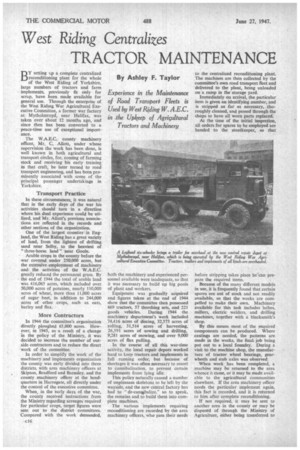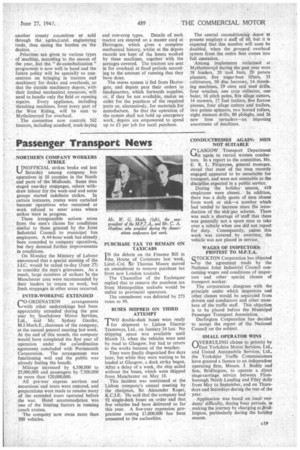West Riding Centralizes
Page 54

Page 57

If you've noticed an error in this article please click here to report it so we can fix it.
TRACTOR MAINTENANCE
By Ashley F. Taylor
Experience in the Maintenance of Road Transport Fleets is Used by West Riding W. A .E.0 in the Upkeep of Agricultural Tractors and Machinery
BY setting a complete centralized
reconditioning plant for the whole of the West Riding of Yorkshire, large numbers of tractors and farm implements, previously fit only for scrap, have been made available for general use. Through the enterprise of the West Riding War Agricultural Executive Committee, a former war factory at Mytholmroyd, near Halifax, was taken over about 12 months ago, and since then has been converted to a peace-time use of exceptional importance.
The W.A.E.C. county machinery officer, Mr. C. Allott, under whose supervision the work has been done, is well known in both agricultural and transport circles, for, coming of farming stock and receiving his early training in that craft, he later turned to road transport engineering, and has been prominently associated with some of the principal passenger undertakings in Yorkshire.
Transport Practice
In these circumstances, it was natural that in the early days of the war his activities should turn in a direction where his dual experience could be utilized, and Mr. Allott's previous associations are reflected in the records and other sections of the organization.
One of the largest counties in England, the West Riding has a great variety of land, from the lightest of drifting sand near Selby, to the heaviest of "three-horse land" near Goole.
• Arable crops in the county before the war covered under 250,000 acres, but the extensive employment of machinery and the activities of the W.A.E.C. greatly reduced the permanent grass. By the end of 1944 the total of arable land was 416,065 acres, which included over 50,000 acres of potatoes, nearly 110,000 acres of wheat, more than 11,000 acres of sugar beet, in addition to 244,000 acres of other crops, such as oats, barley and flax.
More Contractors
In 1944 the committee's organization directly ploughed 65,000 acres. However, in 1945, as a result of a change in the policy of the Ministry, it was decided to increase the number of outside contractors and to reduce the direct work of the committee.
In order to simplify the work of the machinery and implements organization the county was early divided into three districts, with area machinery officers at Skipton, Bradford and Barnsley, and the county machinery officer at the headquarters in Harrogate, all directly under the control of the executive committee.
When, in the early days of the war, the county received instructions from the Ministry regarding acreages required for particular crops, target figures were sent out to the district committees. Compared with the work demanded, both the machinery and experienced personnel available were inadequate, so that it was necessary to build up big pools of plant and workers.
Equipment was gradually acquired and figures taken at the end of 1944 show that the committee then possessed 669 tractors, 57 threshing sets, and 221 goods vehicles. During 1944 the machinery department's work included 74,416 acres of discing, 32,573 acres of rolling, 31.514 acres of harvesting, 26,591 acres of sowing and drilling, 9,281 acres of mowing, and over 9,000 acres of flax pulling.
In the course of all this war-time activity, the local repair depots worked hard to keep tractors and implements in full running order, but because of shortages it was often necessary to resort to cannibalization, to prevent certain implements from lying idle.
This policy naturally caused a number of unpleasant skeletons to be left by the wayside, and the new central factory has had to " de-carnibalize," so to speak, the remains and to build them into complete machines.
The various implements requiring reconditioning are recorded by the area machinery officers, who pass their needs to the centralized reconditioning plant. The machines are then collected by the committee's own road transport fleet and delivered to the plant, being unloaded on a ramp in the storage yard.
Immediately on arrival, the particular item is given an identifying number, and is stripped as far as necessary, thoroughly cleaned, and passed through the shops to have all worn parts replaced.
At the time of the initial inspection, all orders for spares to be employed are handed to the storekeeper, so that before stripping takes place he'can prepare the required items.
Because of the many different models in use, it is frequently found that certain spares are out of stock and not readily available, so that the works are compelled to make their own. Machinery available for this task includes lathes, millers, electric welders, and drilling machines, together with a blacksmith's shop.
By this means most of the required components can be produced. Where castings are needed, the patterns are made in the works, the final job being put out to a local foundry. During a visit to the machine shop, the manufacture of tractor wheel bearings, gearwheels and stub axles was observed.
When work has been completed, a machine may be returned to the area whence it came, or it may be made available to the agricultural communities elsewhere. If the area machinery officer needs the particular implement again, this fact is recorded, and it is returned to him after complete reconditioning.
If not required, it may be sent to another area in the county or may be disposed of through the Ministry of Agriculture, either being transferred to another county committee or sold through the , agricultural, engineering trade, thus easing the burden on the dealers.
Priorities are given to various types of machine, according to the season of the year, but the " de-cannibalization " programme is now well in hand and the future policy will be specially to concentrate on bringing in tractors and machinery for docks and overhauls, so that the outside machinery depots, with their limited mechanical resources, will need to handle only the field or running repairs. Every appliance, including threshing machines, from every part of the West Riding, will be sent to Mytholmroyd for overhaul.
The committee now controls 562 tractors, including standard, track-laying and row-crop types. Details of each tractor are entered on a master card at Harrogate, which gives a complete mechanical history, whilst at the depots records are kept of the hours worked by these machines, together with the acreages covered. The tractors are sent in for overhaul at fixed periods according to the amount of running that they have done.
The stores system is fed from Harrogate, and depots pass their orders to headquarters, which forwards supplies, or, if they be not available,. makes an order for the purchase of the required parts or, alternatively, for materials for manufacture. So that the operation of the system shall not hold up emergency work, depots are empowered to spend up to £3 per job for local purchase. The central reconditioning depot at present employs a staff of 60, but it is expected that this number will soon be doubled, when the grouped overhaul system from the entire fleet comes into full operation.
Among implements reclaimed at Mytholmroy.d during the past year were 58 binders, 20 tool bars, 20 potato planters, five sugar-beet lifters, 33 cultivators, 50 disc harrows, 14 threshing machines, 29 corn and seed drills, four winches, one crop collector, one baler, 16 pitch poles, five silage cutters, 14 mowers, 17 fuel trailers, five furrow presses, four silage cutters and trailers, two potato spinners, two horsed rollers, eight manure drills, 80 ploughs, and 26 new lime spreaders—an imposing assortment of machines.




































































































